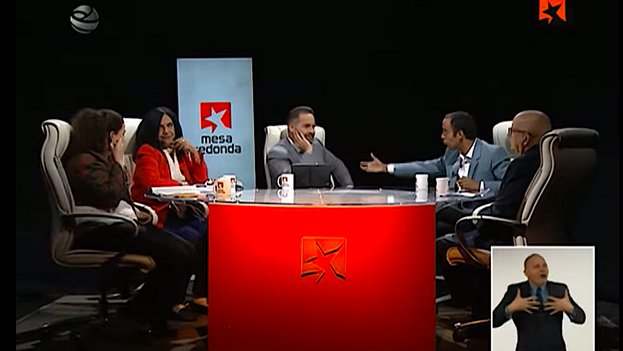
![]() 14ymedio, Havana, 18 January 2023 — None of those attending the Mesa Redonda (Roundtable) program broadcast this Friday on Cuban Television could hide their astonishment when Professor Fabio Fernández Batista said, in front of the cameras, that “the pride of being Cuban has been lost.”
14ymedio, Havana, 18 January 2023 — None of those attending the Mesa Redonda (Roundtable) program broadcast this Friday on Cuban Television could hide their astonishment when Professor Fabio Fernández Batista said, in front of the cameras, that “the pride of being Cuban has been lost.”
Fernández Batista began the debate by attributing Cuban patriotism to a “healthy” nationalism that can be verified throughout the Island’s history. His intervention initially followed the concepts that are navigated at the University of Havana, where he is a full professor. However, he quickly demanded a more “flexible” understanding of patriotism that is not reduced to the geographical.
The professor got up and explained that “there are people who lived all their lives in Cuba and are less patriotic than José Martí,” while others “are in Miami, and right now they are more patriotic than some of those we meet on the street. These are realities that can be shocking,” he admitted, before journalist Oliver Zamora Oria, host of the program, tried to tone down his words.
“I was not mistaken when I said it was a controversial concept,” Zamora Oria said nervously and hurried to take back the floor from Fernández Batista. The professor did not have the opportunity to speak again until the final minutes of the program, and he warned that he was going to be “undisciplined.”
“Patriotism cannot be connected exclusively to the idea of heroic resistance, ’here we are, resisting, like the mambises,’” he said sarcastically. “The homeland also means construction of the future, the crystallization of dreams, collective realizations,” he said, pointing out later that one could not live only from the “past” but that it is necessary to seek a future “of success and prosperity that we can make happen.”
Cuban patriotism is also being “challenged by the deep crisis that is currently marking the reality of the country,” Fernández Batista lamented. “Every day I have access to the WhatsApp posts of all my students,” he said, “and there are many jokes that they share. The central idea is ’how terrible to have been born in Cuba’ and ’how happy I will be when I’m not here’.”
That displeasure is the reason, he said, that “right now there are people crossing the Rio Grande heading north.” To avoid this escape we need to “design a successful country, one that is prosperous for its citizens and capable of understanding the plurality and diversity of the Cuban reality.”
The academic criticized the “allusions to the patriotic” Cuban Government, describing it as “distant from efficient communicative practices” and mentioning the film Inocencia (2018), by Alejandro Gil, as an example of an “effective” audiovisual product. “It’s not the rule, it’s the exception,” said Zamora Oria, trying to bring him back in line, but Fernández Batista did not let himself be interrupted and spat out: “Those ideas where the homeland simply means resistance or holding firm don’t win over the young.”
The host of Mesa Redonda contradicted Fernández Batista and stated that “patriotism has been fundamental when it comes to facing these moments,” alluding to the protests against the Government that have taken place since July 2021. The professor said he agreed but pointed out that he was also concerned about the “daily heroism” of someone who is “standing in line, resisting.”
Zamora Oria preferred to direct himself to the other participants and concluded the debate by stating that it had “lived up to” the concept they were debating. The discomfort of the panelists did not end until the credits of the program had finished.
Professor Nancy Chacón, Rebel Youth journalist José Alejandro Rodríguez, Lil María Pich, a specialist of the Martiano Program, and the graphic humorist Adán Iglesias, of the DDT supplement, who intervened through his cartoons, were also invited to the Mesa Redonda. Everyone admitted that “leaving the country” was a “paradigm” for Cuban youth and didn’t attribute the causes of the exodus to the Government but rather to “the situation” or “cultural factors,” “education” and even “religion and emotionality.”
Translated by Regina Anavy
____________
COLLABORATE WITH OUR WORK: The 14ymedio team is committed to practicing serious journalism that reflects Cuba’s reality in all its depth. Thank you for joining us on this long journey. We invite you to continue supporting us by becoming a member of 14ymedio now. Together we can continue transforming journalism in Cuba.
